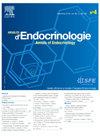Pronosthyc:法国ENDOCAN-TUTHYREF网络的一项多中心研究:放射性碘难治性伴远处转移的分化型甲状腺癌的预后因素
IF 2.9
3区 医学
Q3 ENDOCRINOLOGY & METABOLISM
引用次数: 0
摘要
背景放射性碘难治性分化型甲状腺癌(RAI-R DTC)远处转移患者的预后各不相同,有的病情不严重,有的病情进展迅速。我们的目的是评估RAI-R DTC患者的总生存期(OS),并确定相关的预后因素。方法对1990年至2022年间确诊的远处转移性RAI-R DTC连续病例进行了多中心(ENDOCAN-TUTHYREF网络)回顾性分析。结果我们的队列包括899名患者(52.1%为女性,诊断为RAI-R DTC时的中位年龄为65岁[20-90岁])。中位随访时间为 4.8 年 [0.1-40.1],95.9% 的患者接受了原发肿瘤切除术。组织类型为乳头状(55.6%)、滤泡状(12.2%)、肿瘤细胞状(10.6%)和分化不良(21.6%)。39.4%的转移灶诊断为与原发灶同步,48.2%为大转移灶(1厘米),83.4%为多发转移灶;521名(58%)患者接受了全身治疗。对 332 例(37%)患者的驱动基因突变状态进行了评估:63%为BRAFV600E,29.5%为RAS(21%为NRAS,5%为HRAS,3.5%为KRAS)突变,6%为基因融合(3%为RET,2%为NTRK,1%为ALK)。RAI-R DTC确诊后,中位OS为9.5年(5年、10年OS率分别为74.8%、48.1%)。与较差的OS独立相关的预后因素有:年龄≥55岁(HR = 2.54; 95%CI = 1.84-3.57)、多个转移部位(HR = 2.80; 95%CI = 1.80-4.64)、大面积转移(HR = 1.98; 95%CI = 1.54-2.55)、18FDG-PET摄取阳性(HR = 2.08; 95%CI = 1.30-3.52)。52),而较好的OS与原发肿瘤切除术(HR = 0.50; 95%CI = 0.31-0.86)、分化肿瘤类型(HR = 0.53; 95%CI = 0.41-0.68)、转移表现(HR = 0.64; 95%CI = 0.50-0.82)相关。本文章由计算机程序翻译,如有差异,请以英文原文为准。
Pronosthyc: Prognostic factors in radioiodine refractory differentiated thyroid cancer with distant metastases, a multicentric study from the French ENDOCAN-TUTHYREF Network
Background
Radioiodine-refractory differentiated thyroid cancer (RAI-R DTC) patients with distant metastases have a heterogeneous prognosis, spanning from indolent to rapidly progressing disease. Our aim is to assess overall survival (OS) in RAI-R DTC patients and to identify the associated prognostic factors.
Methods
A retrospective multicentric (ENDOCAN-TUTHYREF Network) analysis of consecutive cases of distant metastatic RAI-R DTC, diagnosed between 1990 and 2022, was performed. Survival was estimated using the Kaplan-Meier method and prognostic factors were assessed by Cox's model.
Results
Our cohort included 899 patients (52.1% females, median age 65 years [20–90] at RAI-R DTC diagnosis). Median follow-up was 4.8 years [0.1–40.1], primary tumour resection in 95.9%. Histotypes were papillary (55.6%), follicular (12.2%), oncocytic (10.6%) and poorly differentiated (21.6%). Metastases diagnosis was synchronous to primary in 39.4%, macroscopic (>1 cm) in 48.2% and multiple in 83.4% of the cases; 521 (58%) patients were treated with systemic therapies. In 332 (37%) patients, driver mutation status was assessed: 63% BRAFV600E, 29.5% RAS (21% NRAS, 5% HRAS, 3.5% KRAS) mutations and 6% gene fusions (3% RET, 2% NTRK, 1% ALK). After RAI-R DTC diagnosis, median OS was 9.5 years, (5-, 10-year OS rates; 74.8%, 48.1% respectively). Prognostic factors independently associated with worse OS were age ≥55 years (HR = 2.54; 95%CI = 1.84–3.57), multiple metastatic sites (HR = 2.80; 95%CI = 1.80–4.64), macroscopic metastases (HR = 1.98; 95%CI = 1.54–2.55), positive 18FDG-PET uptake (HR = 2.08; 95%CI = 1.30–3.52), while better OS was associated to primary tumor resection (HR = 0.50; 95%CI = 0.31–0.86), differentiated tumor type (HR = 0.53; 95%CI = 0.41–0.68), metachronous metastatic presentation (HR = 0.64; 95%CI = 0.50–0.82).
Conclusions
RAI-R DTC prognosis can be stratified by some simple independent prognostic factors of OS.
求助全文
通过发布文献求助,成功后即可免费获取论文全文。
去求助
来源期刊

Annales d'endocrinologie
医学-内分泌学与代谢
CiteScore
4.40
自引率
6.50%
发文量
311
审稿时长
50 days
期刊介绍:
The Annales d''Endocrinologie, mouthpiece of the French Society of Endocrinology (SFE), publishes reviews, articles and case reports coming from clinical, therapeutic and fundamental research in endocrinology and metabolic diseases. Every year, it carries a position paper by a work-group of French-language endocrinologists, on an endocrine pathology chosen by the Society''s Scientific Committee. The journal is also the organ of the Society''s annual Congress, publishing a summary of the symposia, presentations and posters. "Les Must de l''Endocrinologie" is a special booklet brought out for the Congress, with summary articles that are always very well received. And finally, we publish the high-level instructional courses delivered during the Henri-Pierre Klotz International Endocrinology Days. The Annales is a window on the world, keeping alert clinicians up to date on what is going on in diagnosis and treatment in all the areas of our specialty.
 求助内容:
求助内容: 应助结果提醒方式:
应助结果提醒方式:


